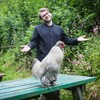All photos by Jake Lewis unless specified otherwiseSomewhere in the darkest reaches of the district of Kennington, an oft-forgotten speck near the bottom of London's Northern Line, is a house. A place that has remained secret for the best part of 20 years, only revealing itself to those with a taste for the occult and arcane (and a confirmation email in their inbox).It is Simon Drake's House of Magic, a hush-hush dinner and show spectacular inside a grandiose and peculiarly decorated converted pub. The attraction is the brainchild of Drake, a magician who appeared on television in the early 1990s in his macabre, S&M-tinged Channel 4 program, The Secret Cabaret.
Advertisement
"I wrote a proposal for a late-night thing for Channel 4. It involved the dark side of magic—secrets and vampire hunters. It involved S&M and brutality," says Drake, when I ask about the show. "With that character, I could do very violent, malevolent things without it seeming cheesy. It was very minimal—I didn't say anything. Not smiley or, 'Tah dah!' It was a completely new format."
The Secret Cabaret. Photo courtesy of Simon DrakeHowever, life on TV wasn't for Drake; a series of unfortunate events forced the now 59-year-old performer to call it a day."People were recognizing me, and for the first week that was fantastic, but then after that, it was a pain in the ass," he says. "I couldn't go anywhere without people shouting, 'Show us a trick, Simon!' There was also loads of fan mail and weird stalker stuff. One [fan] was last seen stabbing a poster of me on the wall of the Hackney Empire with a kitchen knife because I refused to take her home with me."The problems didn't end with the obsessive fans, or the shouty strangers, or the random mugs asking for free card tricks in the street. Ultimately, it was the inner workings of TV that irked Drake to the point of leaving it all behind."I got fed up of making millionaires out of people I considered to be unprincipled," he says. "If you want to be exploited, go into TV—somewhere where people make millions from your idea and you only make thousands. It's nothing new."
Advertisement
The garden at the House of Magic
Drake's foray into the world of magic began long before all this, as the result of a childhood illness."I was sick when I was young—I had perforations in one ear, and when it burst, I was quite ill for a long time," says Drake. "It was painful, and I was deaf for quite a while; my nickname was 'What?' when I was a kid. I became fascinated with visual things because talking, reading, and hearing was difficult for me. My first [dream] was to be a clown, and then a stunt man. I was falling down stairs when I was five years old very proficiently."
While Drake had always wanted to get involved in the performative side of the entertainment industry, his first real taste of the business came in the form of a job plugging records to radio stations for Decca Records—the "dirtiest job in the music industry," he says.Working his way up the ladder, he began performing low-paid magic shows to help pay the rent. Then, eventually, came the TV show and the subsequent decision to give it all up.
The House of Magic, Drake's altar to the strange, filled with trinkets, collectables, and a chintzy basement featuring zip-wire floating heads (a direct jab at the expensive organized terror of the London Dungeon), came about by chance."I didn't even plan this," he says. "I had so many props and illusions after The Secret Cabaret ended. There was a couple of tons of stuff, and I couldn't keep it all in my semi in Chiswick, so I sold [the apartment] and looked out for a warehouse or an old church hall. I looked up the council housing list, and at the bottom, there was this pub called the Surrey Garden Arms. We had a look at it, and it was awful, full of crack pipes and dead rats. But it had this huge function room upstairs, so I put an offer in and got it. I was up against a property developer."
Advertisement
Drake speaks fondly of Kennington, and he bemoans the systematic desecration of community that's been taking place across London as councils continue to put profits above the interests of their residents. "I like the authenticity of the people here," he says. "I was sent to a military school at seven, so everyone spoke very plummy—young David Cameron types."
Part of what makes the House of Magic a special night out is its classicism. There are bawdy, Carry-On-esque gags, and as it's Drake's actual home, there's a distinct family feeling to it, especially among the staff and table magicians who've been hand picked and molded over years of service.As for the show, I don't really want to spoil it. Perhaps the most impressive aspect of the place is its total secrecy, something that—in a time where everything is subjected to a Time Out star rating and trending topic supernova within minutes of opening—is nothing short of a miracle.
British showmanship has a special kind of easy-going quality to it—the kind of approach that wouldn't work in the US, where loud, flashy brashness tends to be favored over subtlety, especially when it comes to magic shows (Penn & Teller being a good example).Drake knows this, which is why he's dedicated his post-TV career to entertaining in a way that utilizes that sense of secrecy he's worked so hard to cultivate, inviting people into this mysterious converted pub and making them feel like they're witnessing something they shouldn't be witnessing.And, he says, he has no plans to change: "America's Got Talent rang me up and asked me to be on the show. I said, 'I'm not American, fuck off.'"Follow Joe Bish and Jake Lewis on Twitter.
